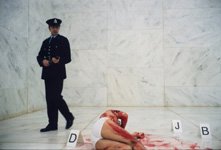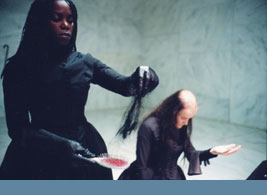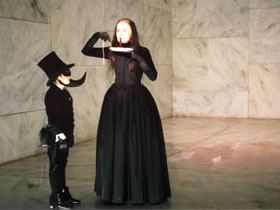
The show is just one part of a massive 11-play cycle (the Tragedia Endogonidia); each part was developed upon arrival in a city, and as a direct response to that city's history, culture, and so on. We got Brussels, and I read somewhere that Brussels was once the seat of legislative power in Europe or some guff like that, so themes of governance, institutionalised power and dominance run throughout this episode. But there's also a more generalised evocation of power and powerlessness centred on time, aging, duration, growth, decay, and hair loss.

The show is made up a number of sequences, wordless all, played out in a massive white-marbled cube suggesting a museum, palace, cell or church (among other things). The scenes are densely cryptic, travelling in directions often quite unexpected; sometimes they don't really travel at all. The first, for instance, sees a cleaning woman slowly moping the floor, boredly, maybe absent-mindedly. BORING. Or not. I found it hypnotic after a while, and began watching the way that the arc of her mop sweeping across the marble created a kind of mandala effect after a while: she wasn't randomly swishing the thing around at all. I didn't know what it meant, and I suspect it might have meant nothing, but it gestured at the possibility of meaning. Sums up the whole show, that.

Now, it's nothing new to lay out a stack of signifiers and refuse us the ability to construct any kind of sense from them. Normally I can't stand that kind of theatre, since it's so hard to do well. But I don't think that's the result here. Castellucci's created a tragedy without a chorus to explain the events we're seeing for us. We're not being told why these events are significant, or how we supposed to interpret them.

Since the Greeks, the chorus has been a hugely influential tool in theatremaking, and you could say that later modes saw the chorus internalised into the drama itself, so that the language and staging and so on maintained its function. A piece of theatre usually, in some way, says "this is this" and then "this is why it's here before you". Castellucci cuts that out, which is a very different thing from cutting out meaning or significance entirely. What we see on stage are very dramatic and gripping events, but there's no commentary of any kind which forces us to interpret them in any given way.
It wouldn't work if the scenes produced weren't so provocative, I suppose. And if you did't find them so, you'd probably be pretty switched off by the production. But for me, the image of a live human baby maybe six or eight months old sitting alone and unattended on a huge stage, gurgling away merrily, noticing a toy and picking it up curiously, slowly beginning to register some painful thought or feeling and transforming its face into a mask of rage or disappointment, then just dropping it all and thinking about something else: I was absolutely enthralled by what I will gladly call the Performance of the Year. And upstage, a naive cut-out face propped up on the floor began to open and close it's mouth and eyes, reciting numbers in a garbled voice. What was the connection? Was it the child being taught by rote? Was it technology as dumb infant? Was there comparison and contrast or connections to be made?
In a way the automaton reminded me of the play itself: it was a narration without a narrative, a plot with out a story (in the Russian Formalist sense), it was the hollow decoration that delights with its movement but contains no deeper soul inside. Because it was hollow, it had that levity I was thinking about yesterday: it wasn't 1984, screaming "this is important!" It was useless in the best way, in the Wildean sense ("all art is quite useless", says Oscar, and I wholeheartedly agree with that complex suggestion). It's the laughing seriousness advocated by Sartre, too, the work which approaches the truth by revealing the floating and ephemeral and plain silly nature of any kind of truth.

Man, it was a good show. Or not, maybe.
No comments:
Post a Comment